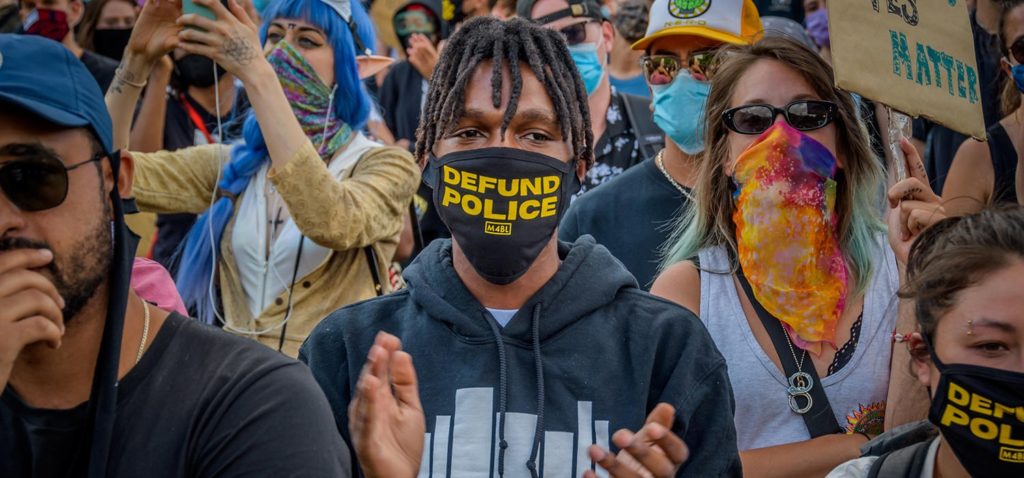Across the country, uprisings following the murder of George Floyd by Minneapolis Police Department have been building steadily. They have grown even after the recent arrest of all four officers who killed Floyd. The demands of these protests are varied from the reformist (Reform the Police!) to the more revolutionary (Abolish the Police!). However, one demand has begun to join these two wings of the movement together, gaining almost hegemonic control over the dialogue, the demand to Defund the Police. This is written on signs, trending in hashtags, and incorporated into chants.
The demand is certainly a progressive one: it shows that people who fought against police brutality in 2014 at the start of the Black Lives Matter movement and new activists alike don’t want more empty promises of “police accountability.” After thousands more deaths of Black people at the hands of the police, we all have seen that body cams and “sensitivity training” didn’t end police brutality.
The call to “defund the police” also springs from the outrage surrounding the level of funding police departments receive as compared to public services, such as schools. As police budgets ballooned, so did inequities in society. Even as we entered a severe economic crisis this year, police departments were not in danger of seeing their budgets decrease. It took a nationwide uprising in every major city in the U.S. to even consider making some cuts. This is not coincidental. The police are the armed enforcers of capitalist law and order and the protectors of private property. As billionaires get richer and the working class gets poorer, harsher and harsher measures are necessary to keep the working class in line and enforce divisions in capitalist society.
The enforcement of these relationships is violently racialized. Black and Brown people are criminalized, incarcerated, and killed by police at massively disproportionate rates. This is because the criminal “justice” system, the police, and the state as a whole are all aligned in defense of a racist capitalist system that profits off of the exploitation and death of people of color. It’s not an accident that as police budgets skyrocket, so do cases of police brutality against people of color who are criminalized by a system that systematically impoverishes and disenfranchises them.
The demand to defund the police is coming from a large proportion of people who have realized that the entire system of policing in the United States is rotten and racist to its core. But the slogan has a very dangerous limitation: it’s not specific enough. As we are already seeing, it is easily co-optable by so-called progressive politicians who only want to offer pitiful reforms like minuscule budget cuts rather than attack the evil system of policing at its core. A new group of people is realizing that policing itself cannot be reformed. To push this forward towards the abolition of the police, we need to be very clear that the demand isn’t for cutting back budgets, but rather, the full defunding of police departments. We must defund the police to zero.
Co-Option By Any Other Name
Many in the Democratic party have begun to respond to this movement with very clear attempts to co-opt the movement. Joe Biden, Nancy Pelosi, and others in the establishment wing of the party have proposed reforms while so-called progressives like Alexandria Ocasio-Cortez have joined the call to ‘defund’ the police. But be they from the establishment or the progressive wing of the party, all of these Democrats offer reforms that may scale back the police’s funding in this or that area but does next to nothing to actually get rid of the institution of policing itself.
For example, the NYC Comptroller has recently given in to protester demands and announced a $1.1 billion proposed cut from the budget of the New York Police Department (NYPD). But $1 billion is a small portion of the overall budget of the NYPD, which is currently around $6 billion. A 16% budget cut may not enable New York City from hiring a round of new cops or pay for extra riot equipment, but it will not stop NYPD from continuing to arrest Black and Brown people for no reason at all. Further, simply defunding it for one year offers no guarantee that the city governments won’t just re-fund it once people have left the streets.
But even when the demand is taken further, defunding as a strategy against police terror has other limitations. Look at Minneapolis, the epicenter of the current uprising. The Minneapolis City Council made headlines when they announced that they had a veto-proof majority that supported disbanding the police force, defunding it for good. Many protesters were overjoyed. Certainly this is an example of elected officials bending to the will of the protesters and being forced to address the delegitimization of the police department. However, when investigating the actual details of the Minneapolis City Council’s proposal, what is striking is that there are none. They have given no specifics about what disbanding the police actually means and they’ve given no timeline on when they will actually start the process. Once again, we see politicians telling people what they want to hear to get them out of the streets and then turning around without giving them the change they demand.
The Democratic Party is called the graveyard of social movements for a reason. For all of their Kente cloth, tears, and photo ops, the Democrats are just as invested as the Republicans in keeping an armed wing of capital and will never support any measure that actually challenges the power of the police. To ensure that Democrats can’t appropriate the “Defund the Police” demand into their platform, rendering it a toothless attempt to get people out of the streets without ceding ground on anything, we need to be clear that the only amount of police funding we will accept is zero.
Defunding Isn’t Abolition
But the problem isn’t just that bourgeois politicians are particularly adept at co-opting progressive slogans, though this is certainly true. The “defund the police” demand itself is particularly susceptible to shifting the movement away from pressure in the streets to electoral politics, which cannot achieve the only thing that can bring an end to police terror: abolition of the police. In that sense, the demand to defund the police runs the risk of being apolitical, ignoring the fact that the fight against police brutality must be anti-capitalist and therefore we can’t just take it to the ballot box. We need to keep up the pressure in the streets, making it clear that we won’t wait for the next city council meeting for minor budget cuts — the only acceptable solution is zero funding for police and the abolition of policing altogether.
But how do we link the two? The way that the conversation around defunding the police is usually framed either treats abolition of the police as an automatic consequence of defunding police departments or the two are used interchangeably. It’s assumed that defunding particular police departments ultimately entails abolishing the institution of policing in the United States. In a recent DSA meeting in New York City, for example, one presenter explained that, as socialists, we must take up the call for gradually defunding police departments with a perspective of abolition. The logic goes that if there’s less funding for police, there is no way to maintain police departments; as police departments get smaller and money from their budgets is diverted to other social programs like healthcare and education, eventually there will come a point when there will be no police to enforce racist laws or inflict brutal bourgeois “justice” on working and poor people, especially on people of color.
But the limitation of this strategy is that a budget cut or getting rid of this or that police department does not also get rid of the role that police play in capitalist society: maintaining class antagonisms through racist violence and protecting private property. Gradually defunding the police does not get rid of laws that criminalize working people. It doesn’t get rid of the carceral system. Even if we could defund police departments to zero, removing the material conditions maintaining that particular manifestation of state repression, this does not remove the material conditions that create the need within capitalism for armed repressive wings of the state to begin with. Gradually chipping away at the police system here and there will not get rid of policing or police violence.
Look at Camden, New Jersey, which disbanded its police force in the early 2010s. It is being referenced again and again in the media as the pinnacle of alternative law enforcement. But disbanding and defunding the police did not get rid of policing there at all. Instead, the local police were replaced with county police which, in turn, re-hired many former Camden police officers with raises.
And it did not in any way put a stop to police brutality. In 2014, the county police force in Camden had the highest rate of excessive force allegations of any force in New Jersey (including one man who accused Camden County officers of breaking his neck and leaving him quadraplegic). Furthermore, the budget for Camden County Police, which only operates in Camden and not any of the other towns in the county, is higher than the police budget of Patterson New Jersey, which has double Camden’s population. Even this apparently radical reform was overturned when politicians found an opportunity to do so; the state found a way to ensure Camden was policed and give the County Police all the funding it needed.
To put it plainly, as long as we have private property, as long as a relative few capitalists and corporations control the world’s resources and oppress the vast majority, something will exist to enforce these social relations. Something will have to exist to uphold bourgeois laws to ensure the functioning of capitalist society; and to put down any force that threatens it. After all, policing in its current form hasn’t been around forever: the modern day police department in the United States developed out of more informal structures — but no less brutal and racist — like slave patrols and night watches. So even if we were able to get rid of the police, something else would take its place as the armed repressive wing of the state. Maybe it will be the sheriff’s office or community police, maybe it will be private security forces — regardless, as long we have capitalism, we will have policing in some form.
What this means is that the entire bourgeois capitalist state has to go, and with it the oppressive class relations that it protects. We cannot abolish the police without also abolishing the system that created it in the first place.
This does not mean, however, that we put the fight against the racist police off for another day or for when conditions are better. To the contrary, it means we fight the police with everything we’ve got here and now — and the way to do this is by linking the fight for police abolition with the larger fight against capitalism. Because if the current uprising, the pandemic, and the economic crisis have taught us anything, it’s that the police are part of a larger system of racist oppression, one that denies people of color and other working people shelter, healthcare, and food on the table. The police and politicians who defend them are the guardians of that world order. Capitalism and the institutions designed to protect it are responsible for violence in society. So we demand gutting police budgets to zero and abolishing the police entirely — and we must do this in the streets, alongside the labor movement and all movements of those oppressed by the capitalist system.












